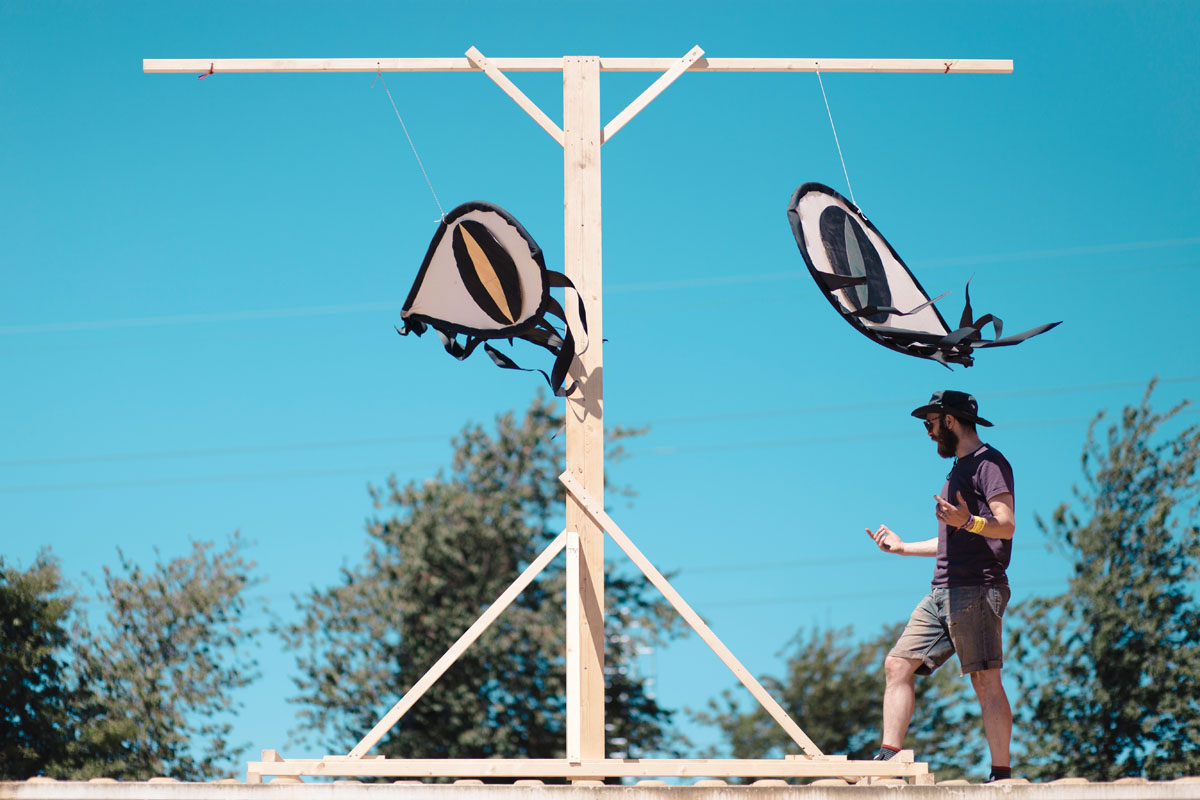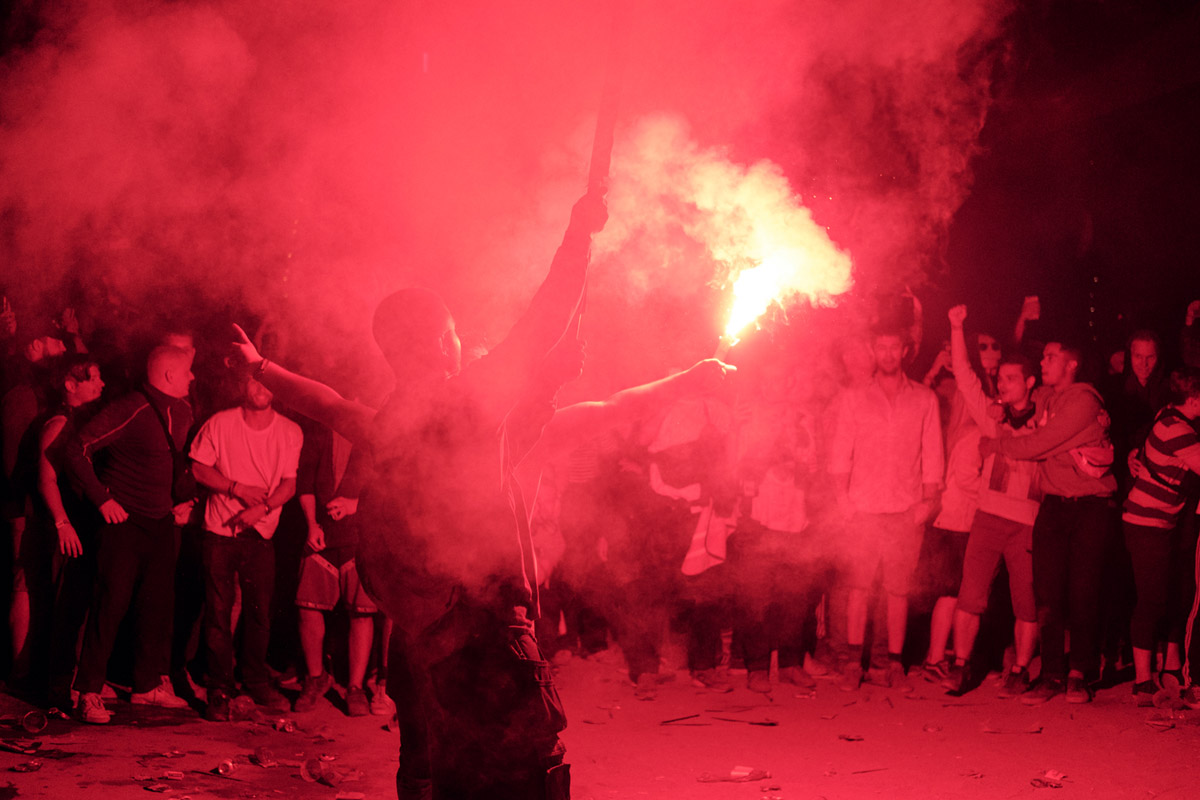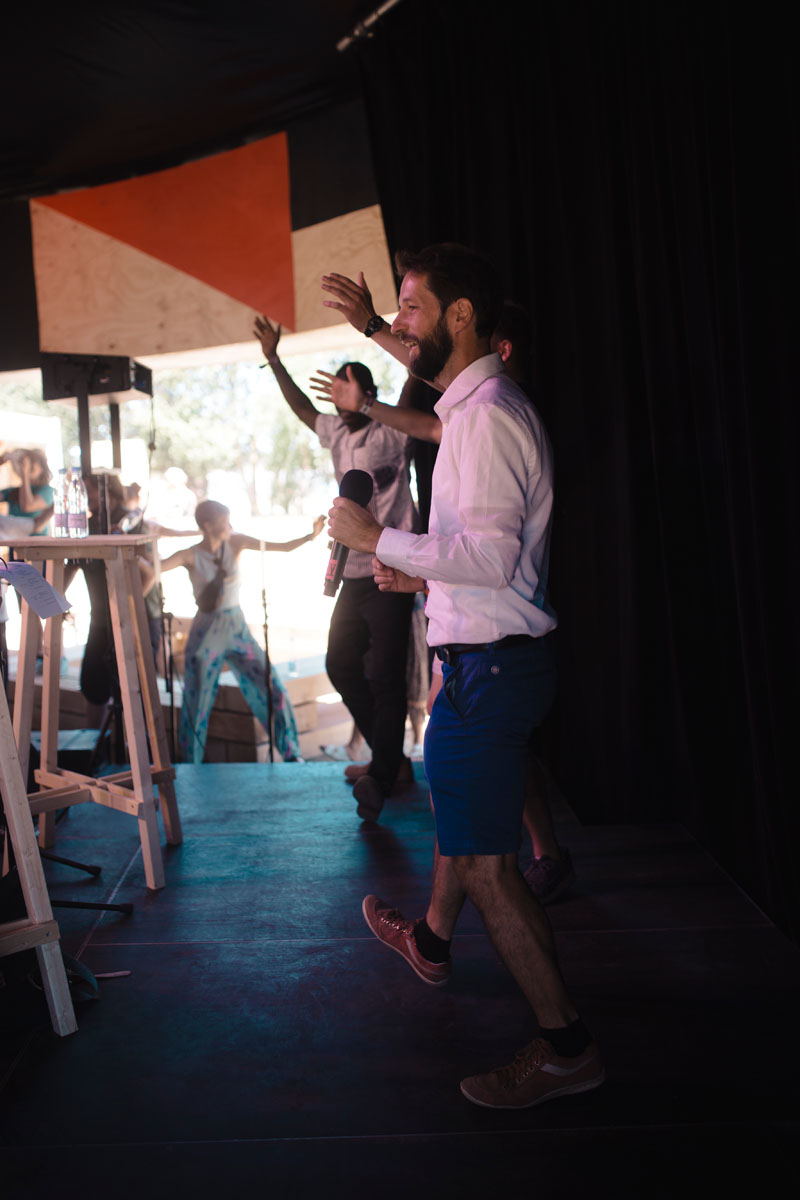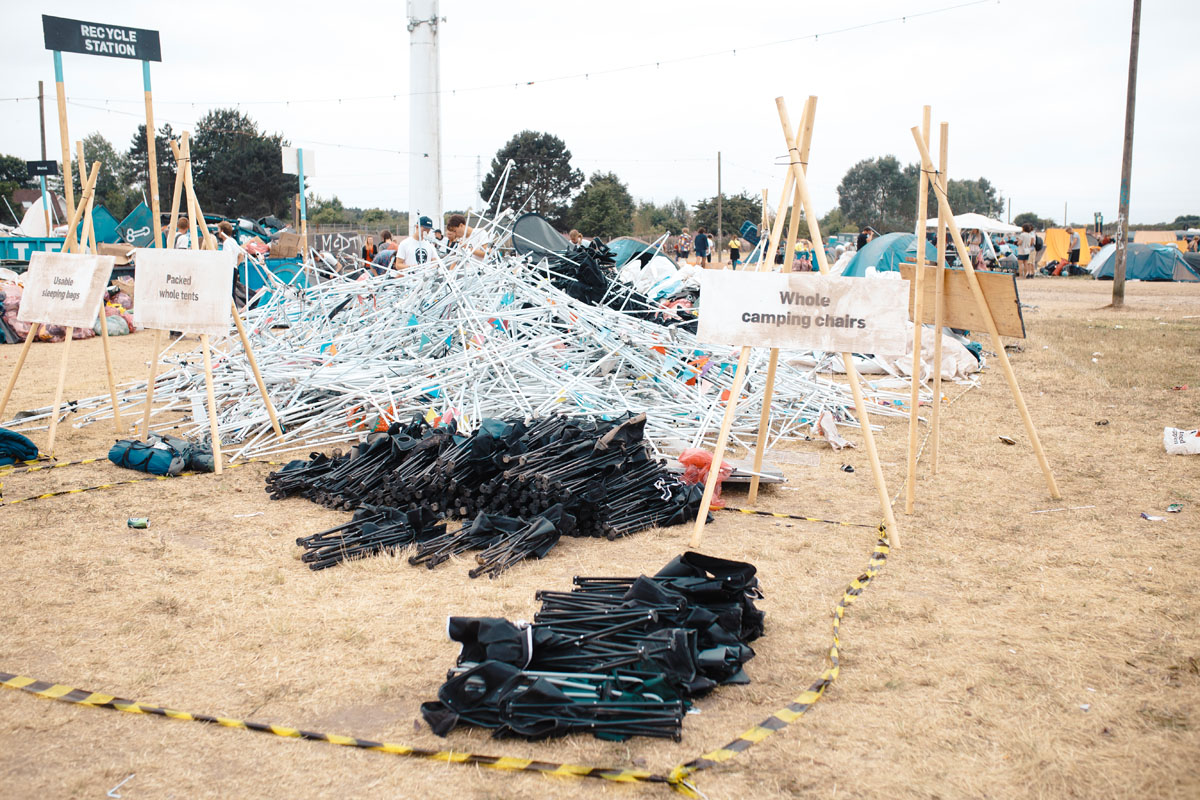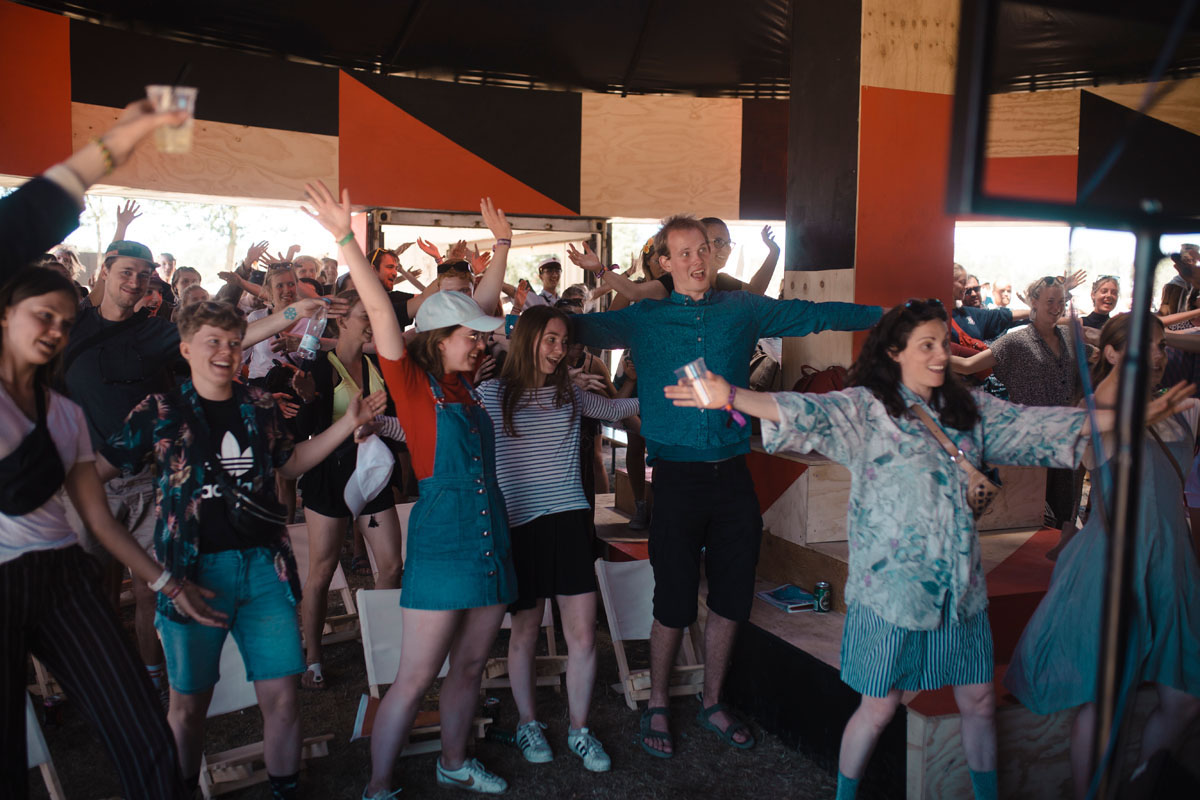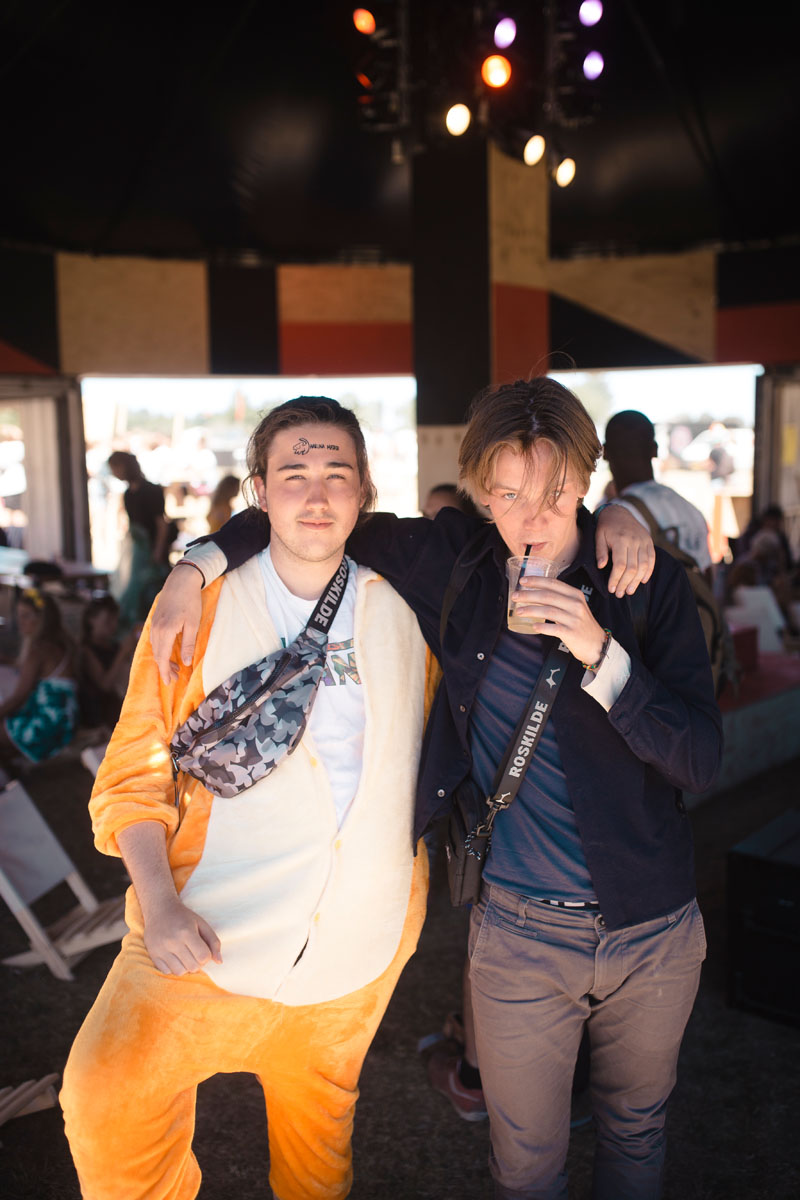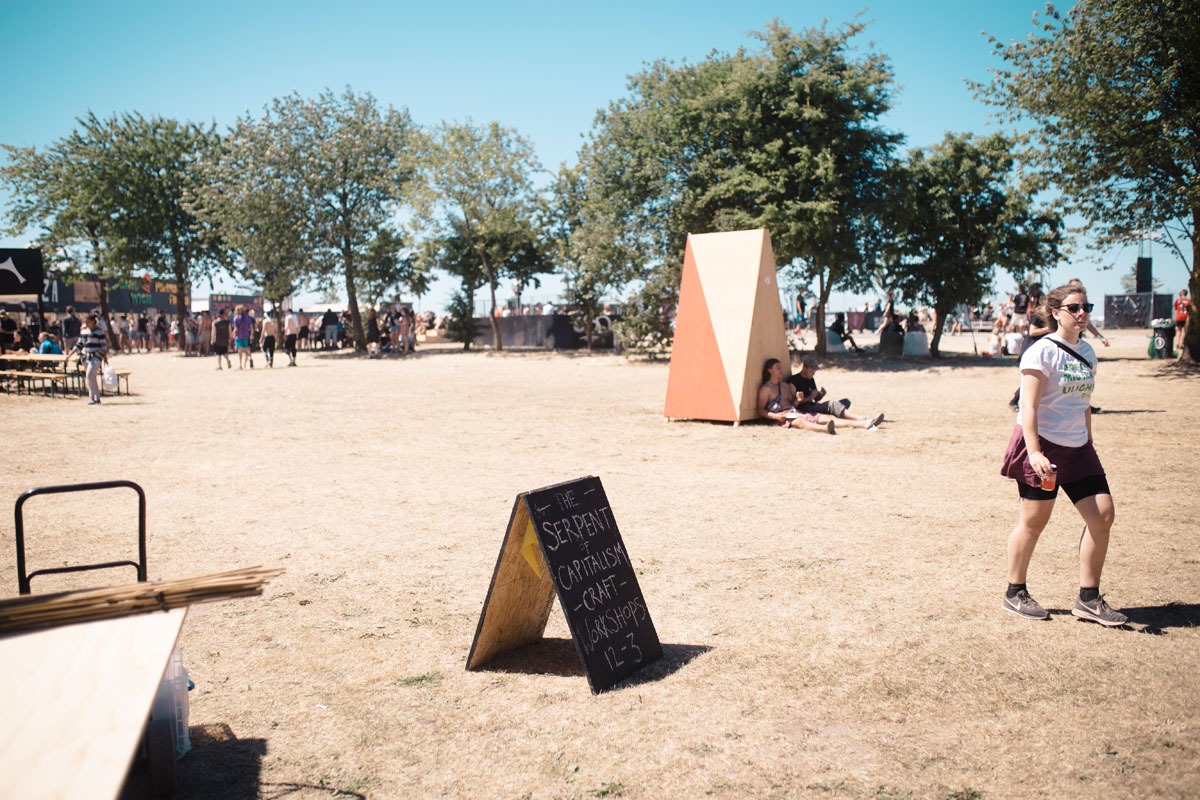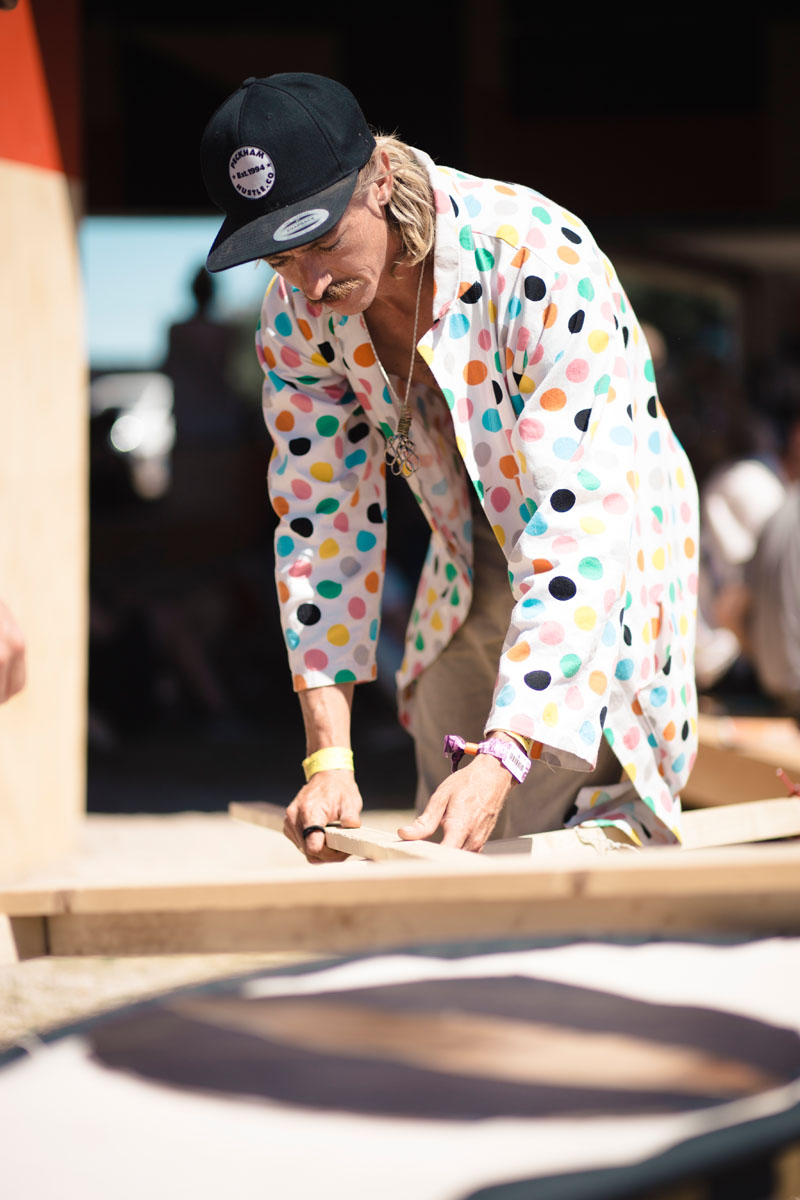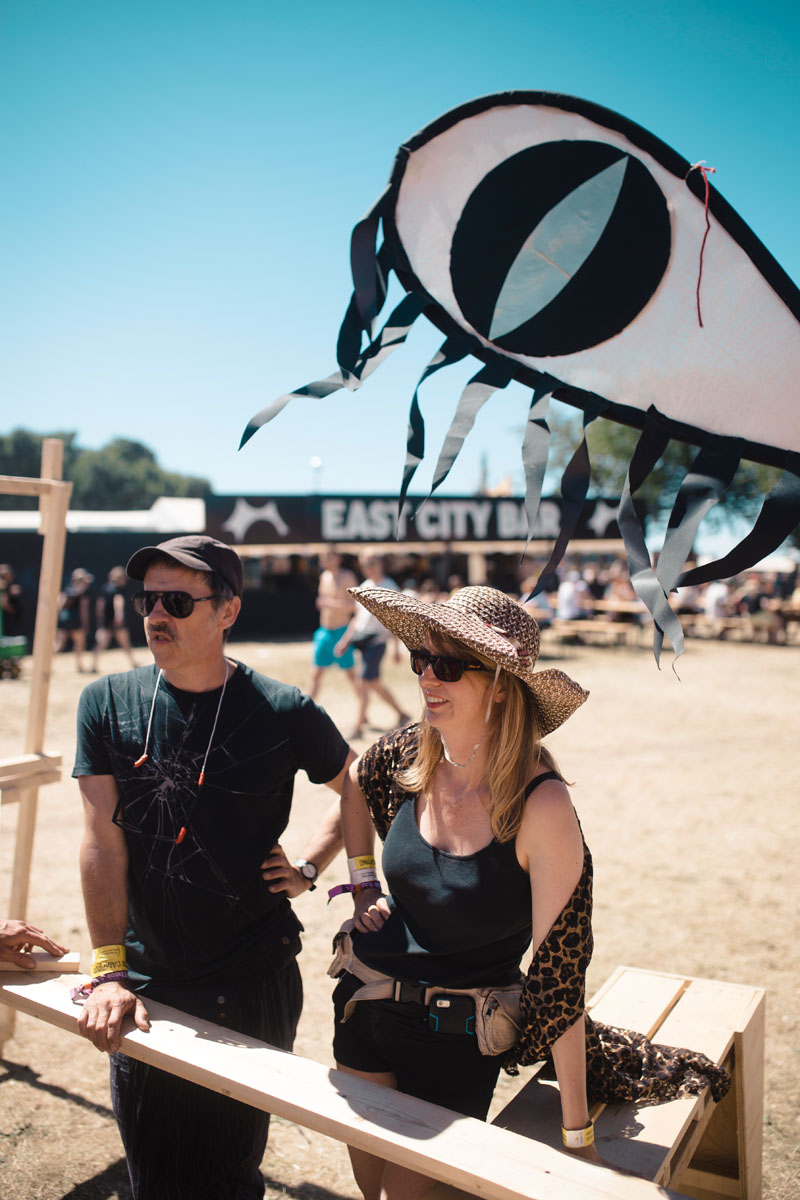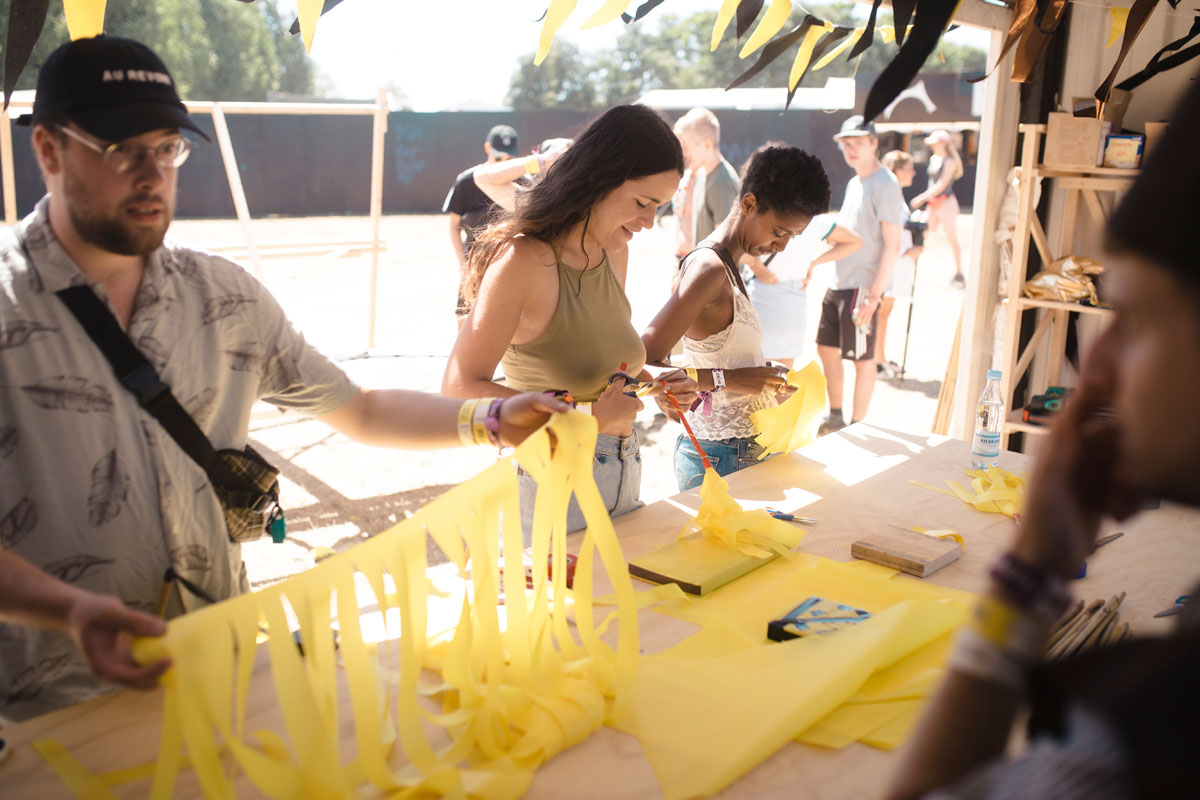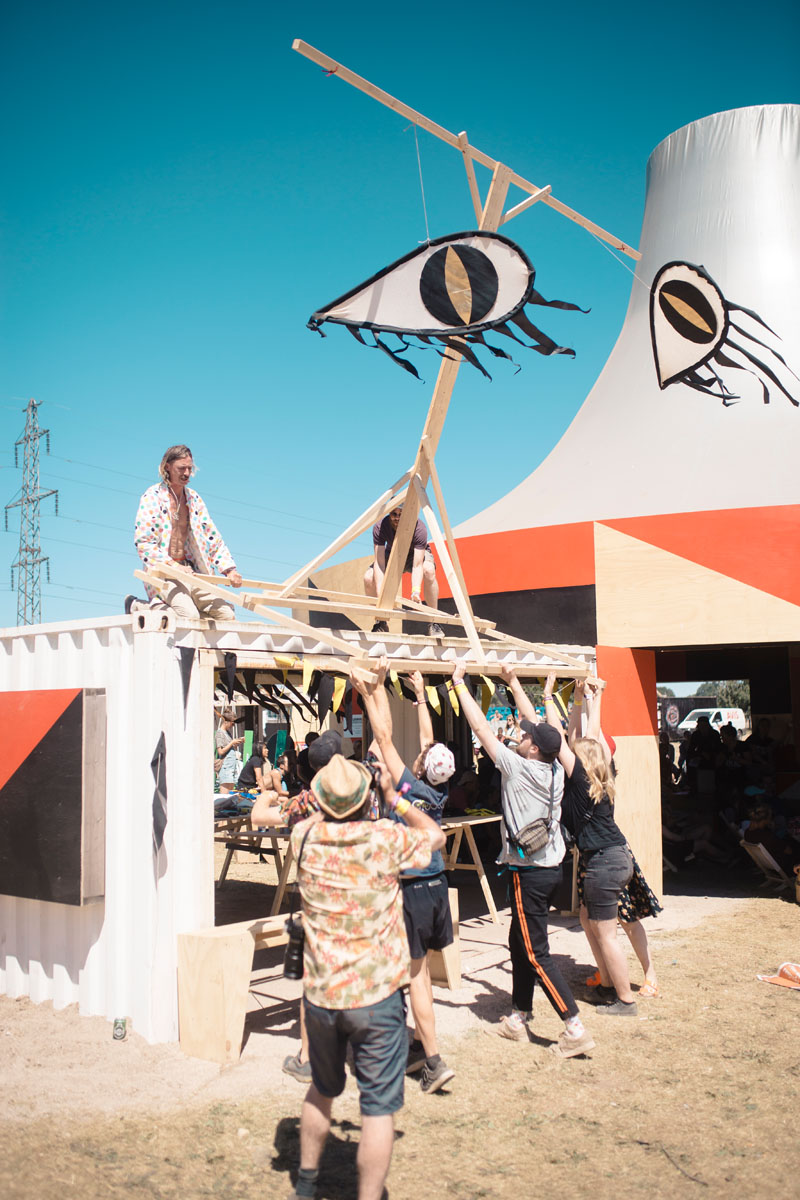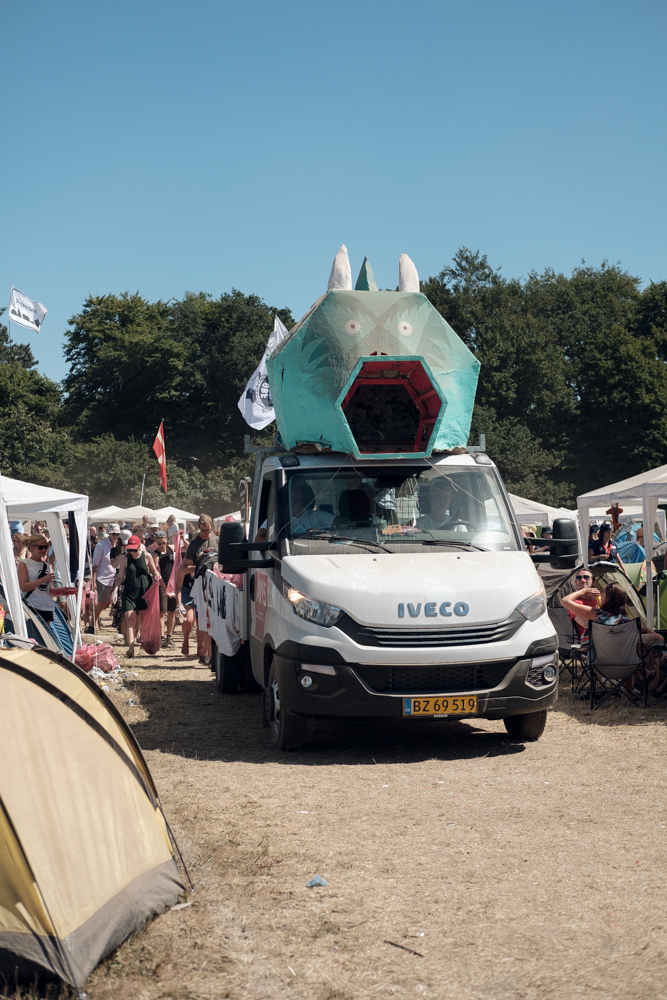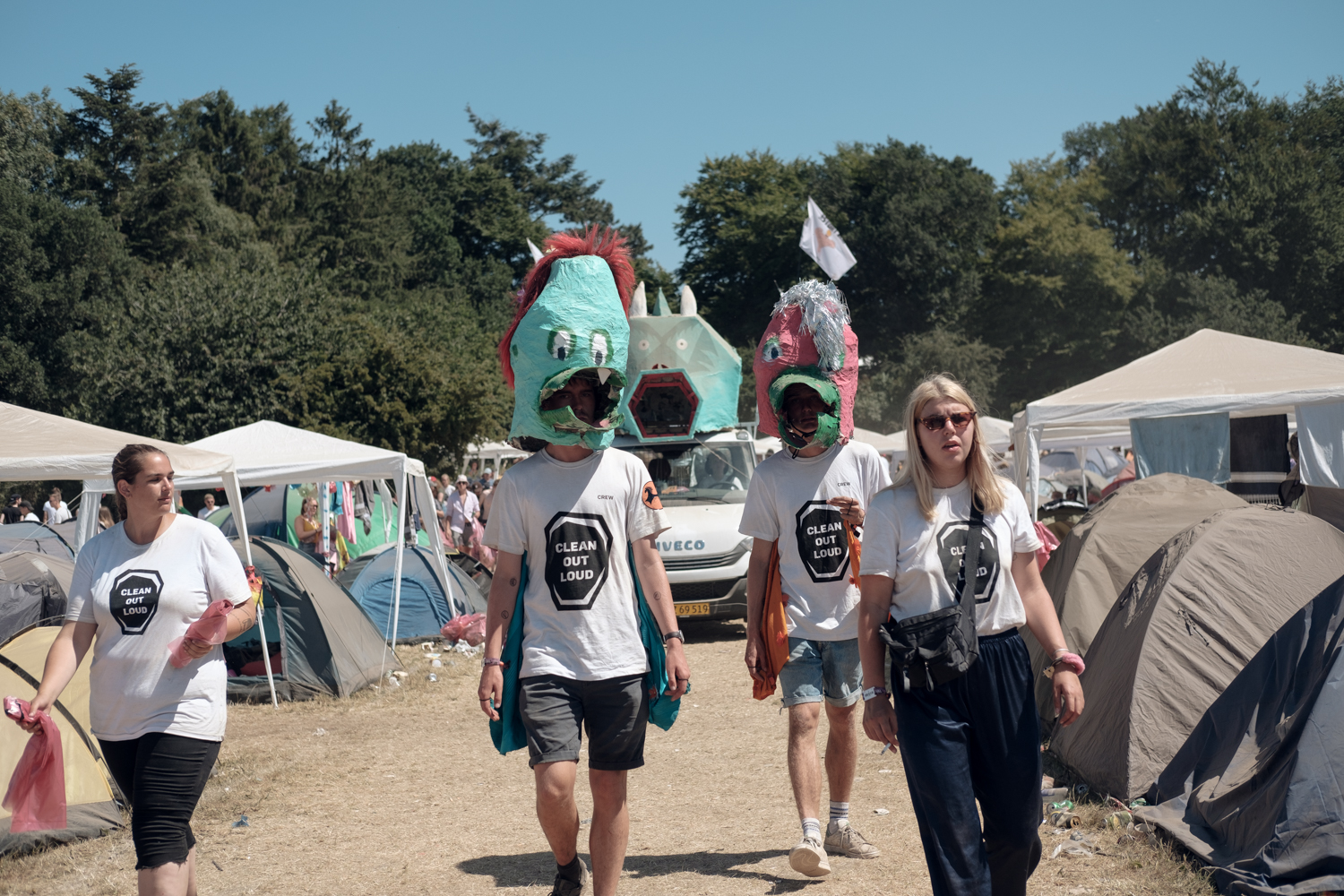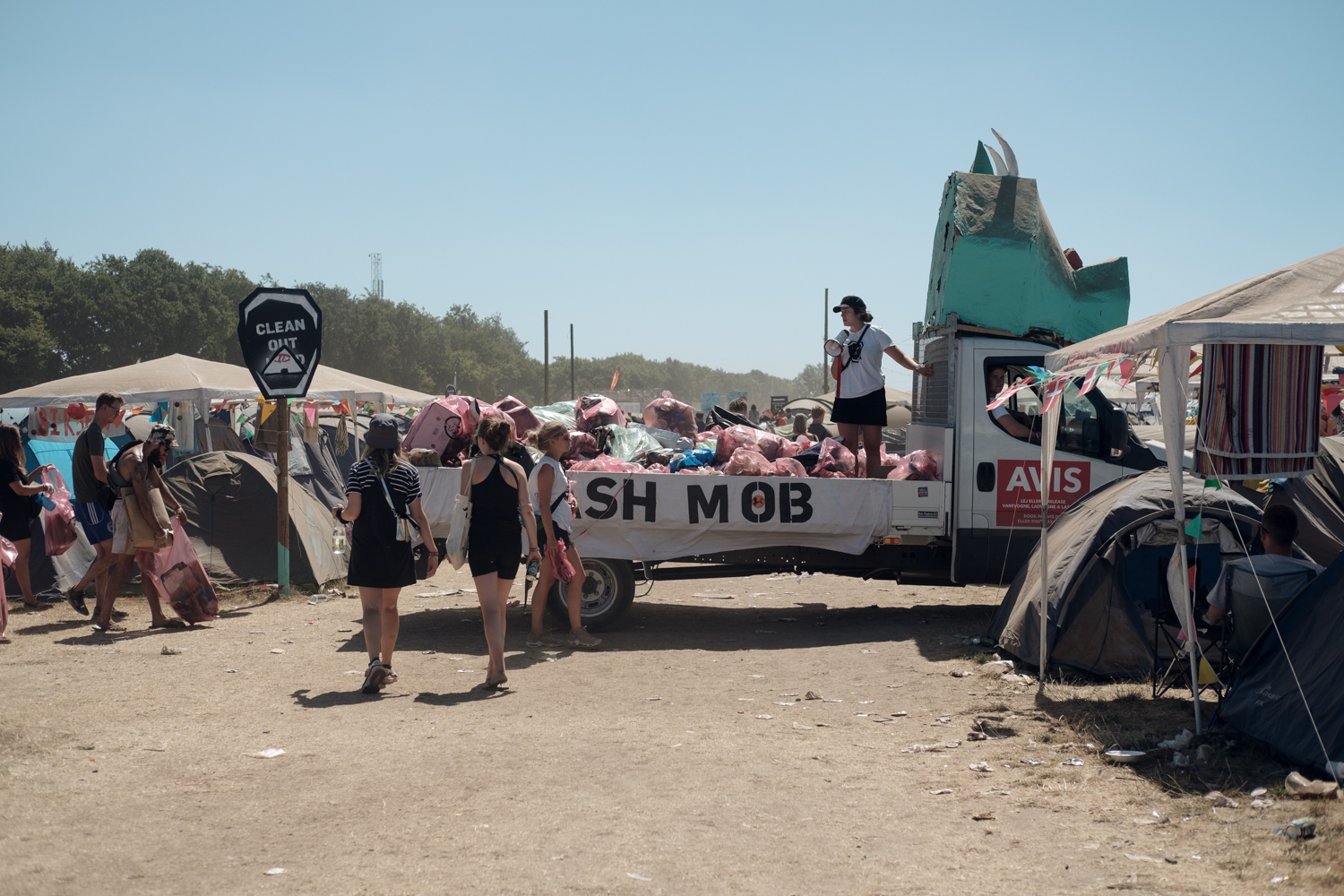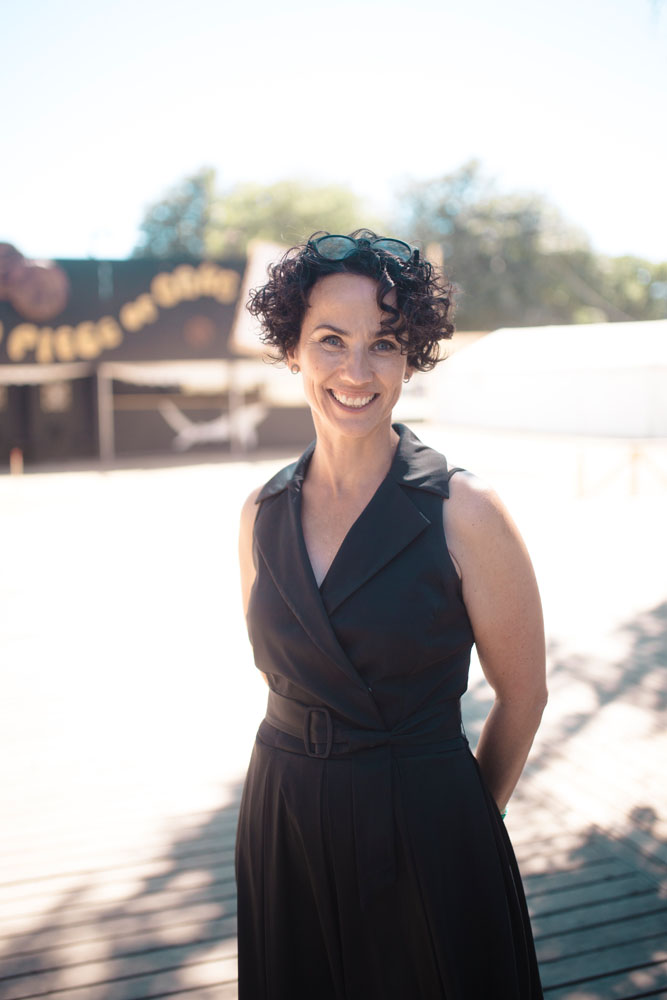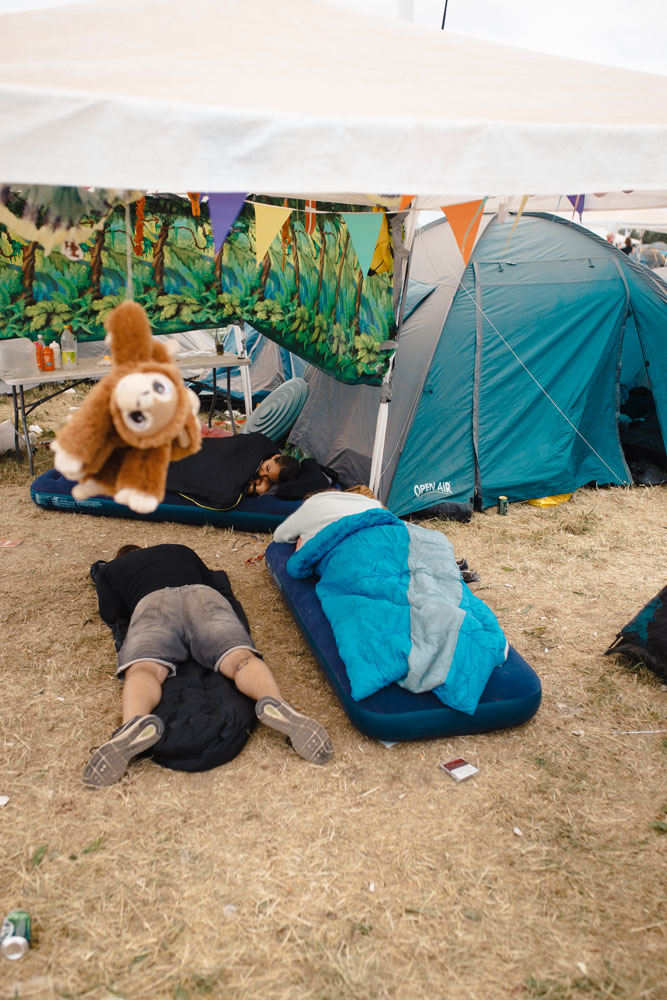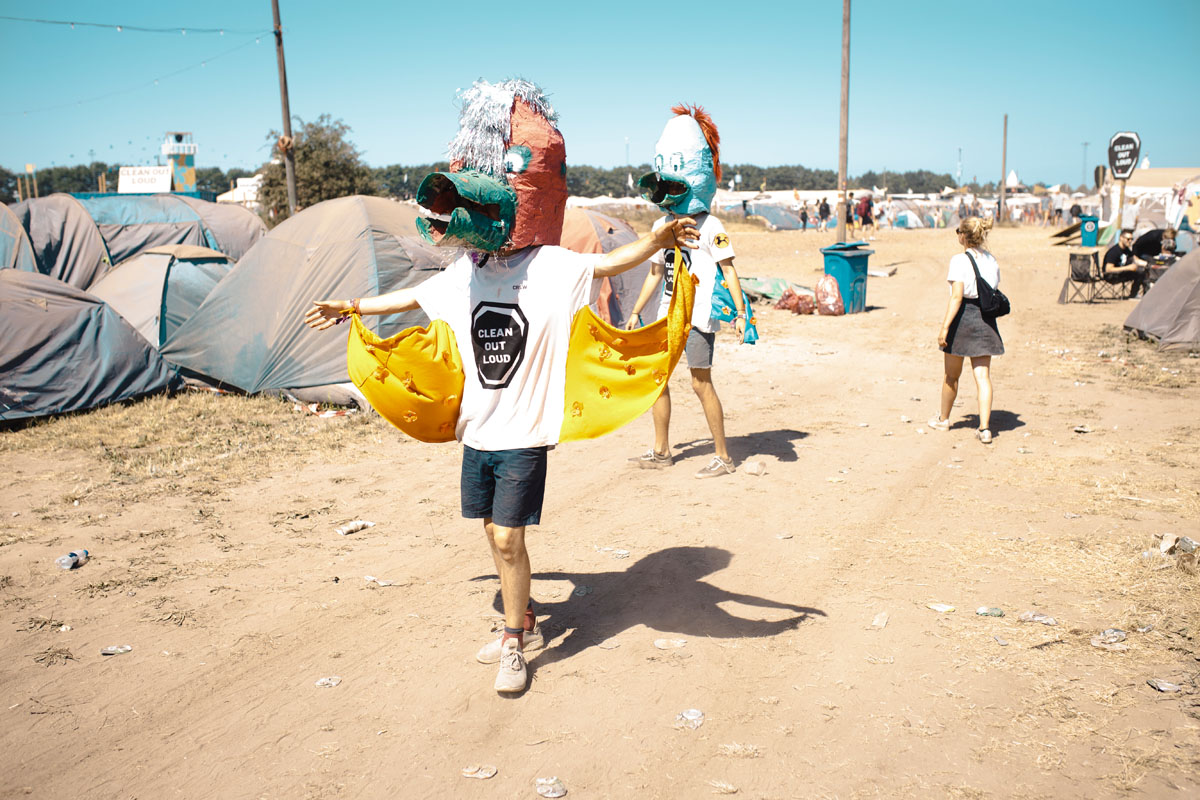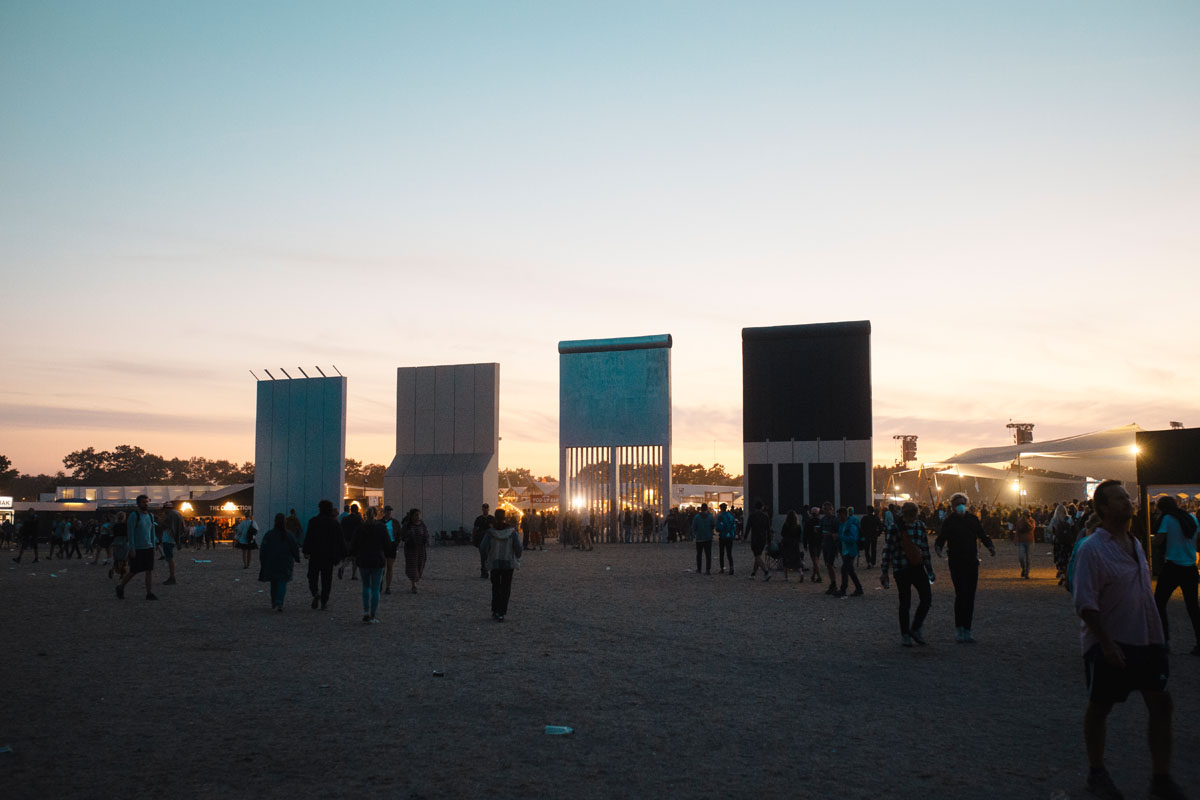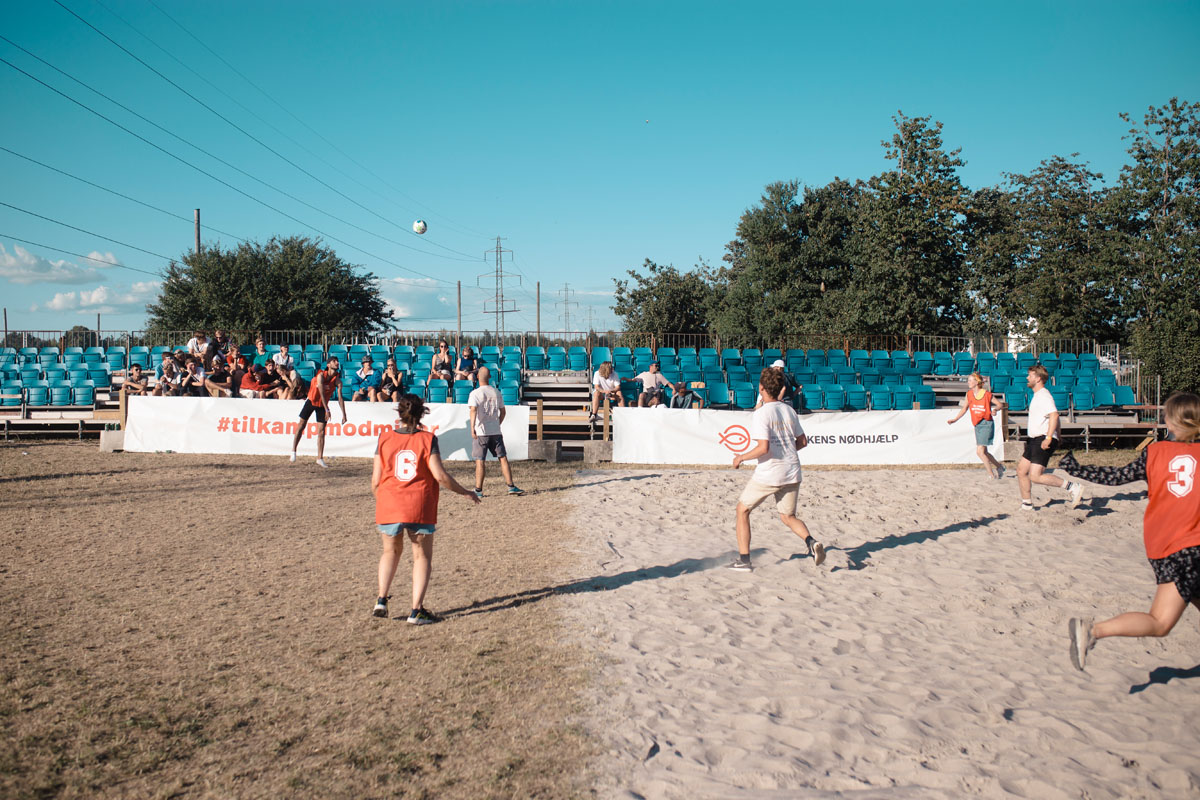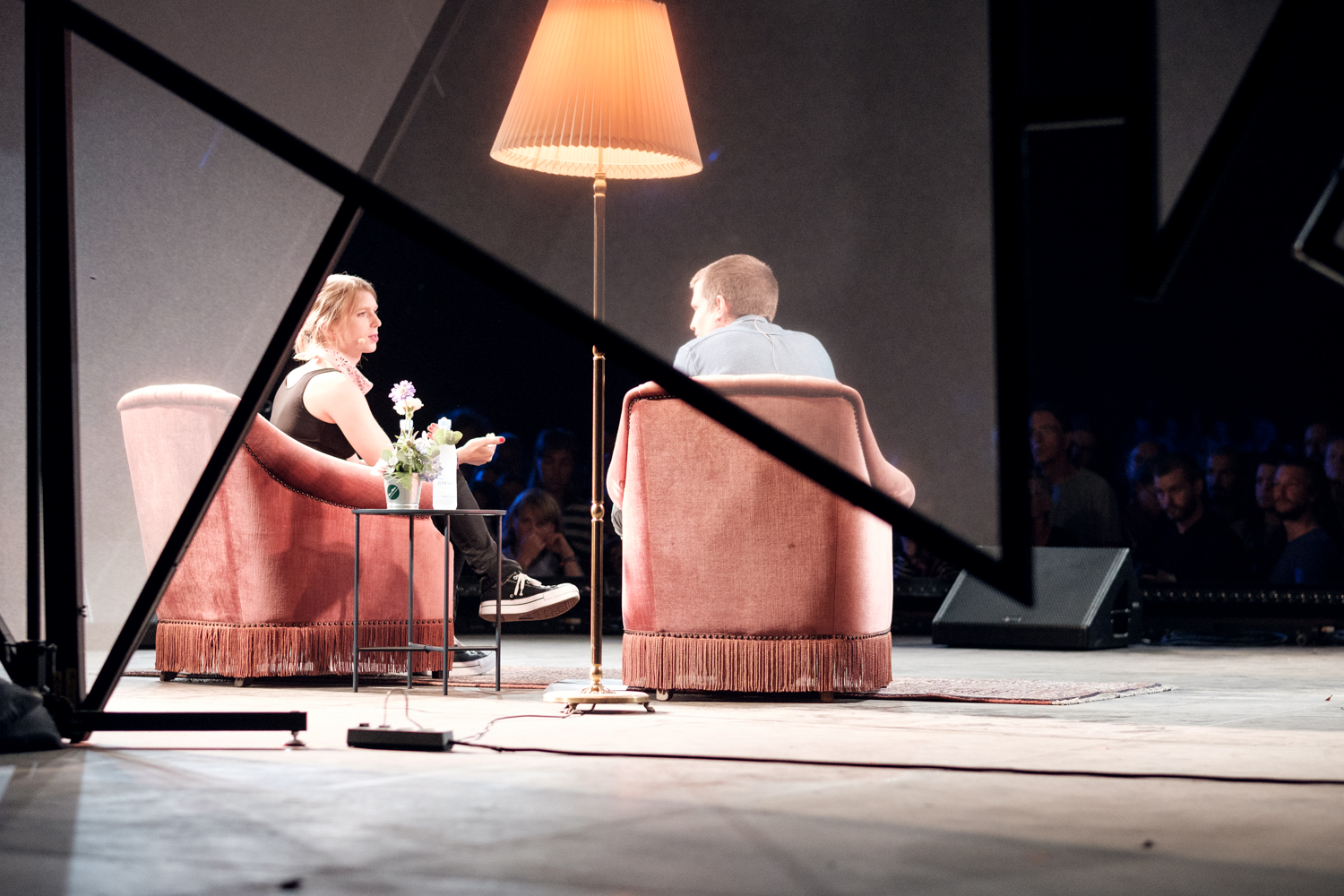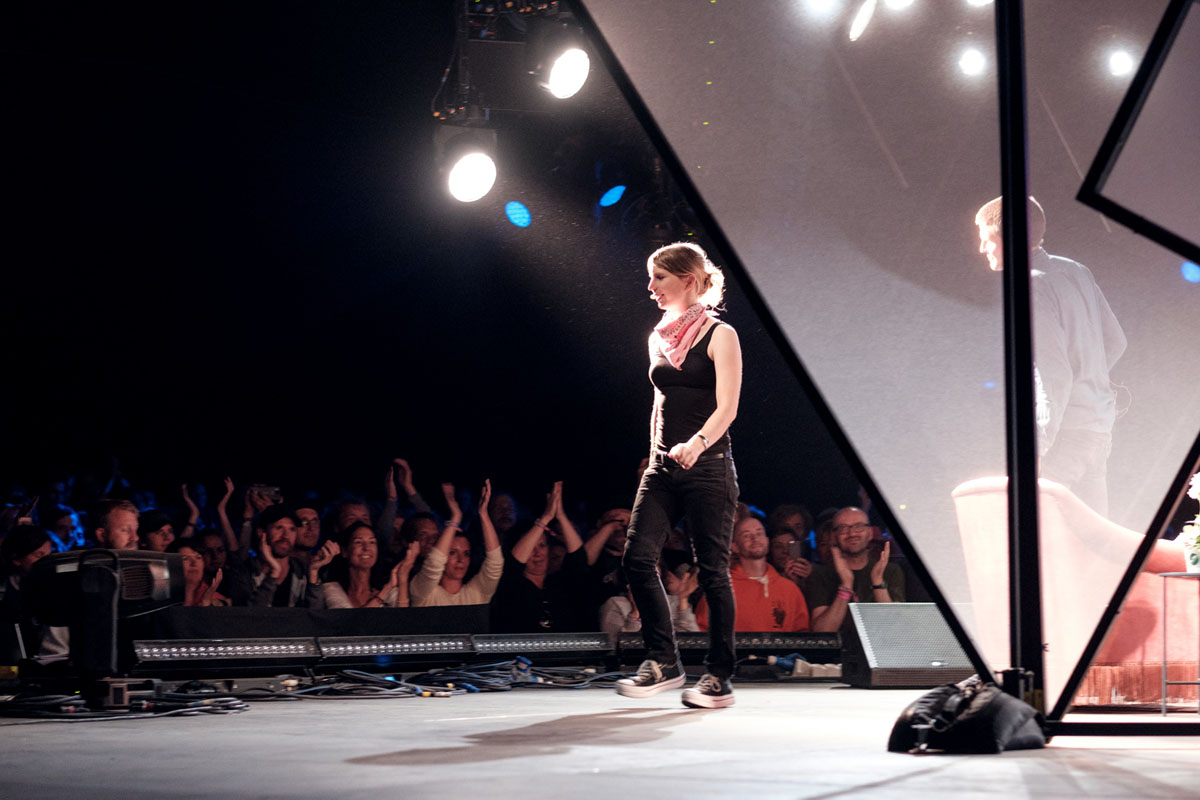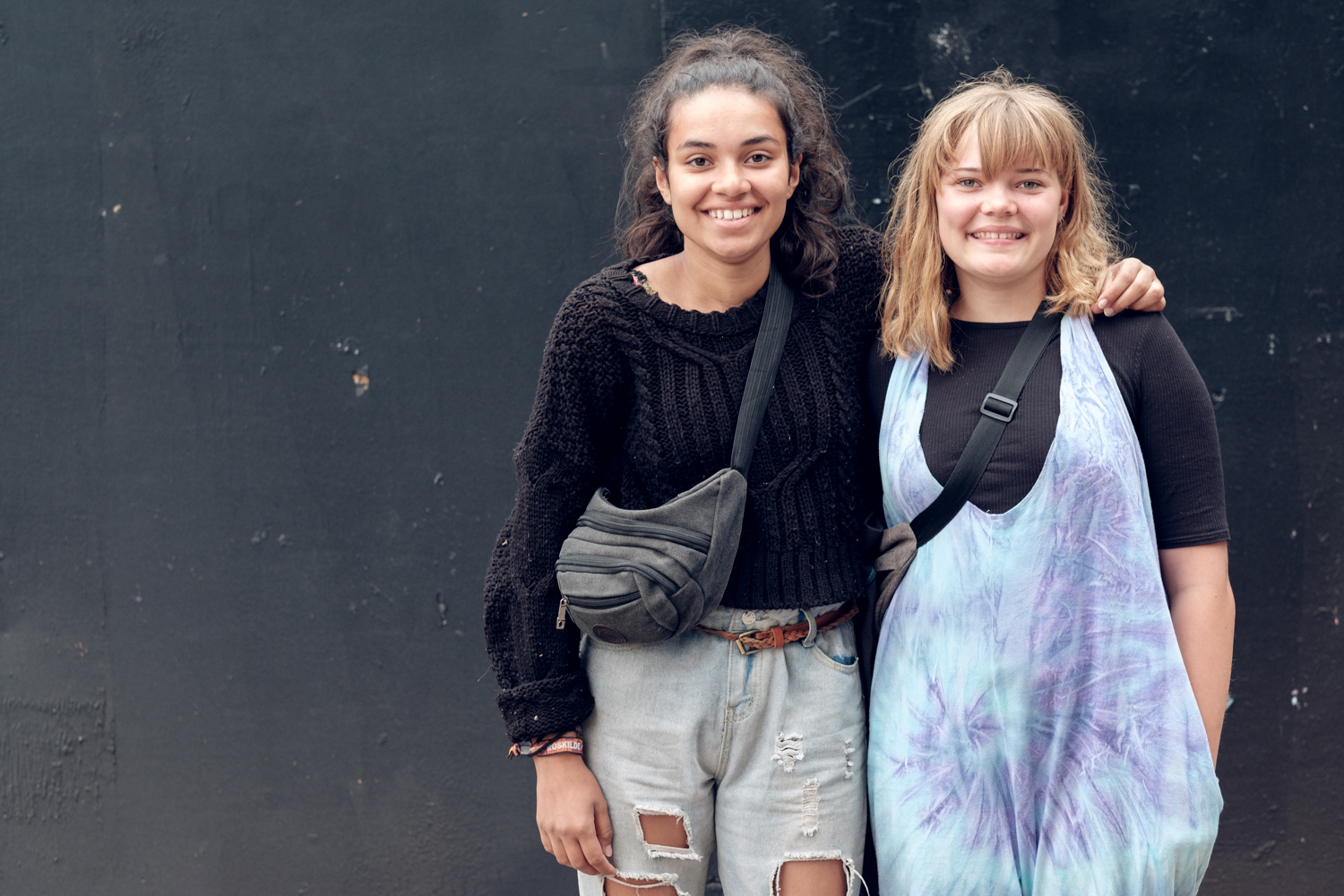Festival and politics, do they get along? We went to the Roskilde Festival, wondering how Chelsea Manning, debates on climate change and anti-capitalistic art performances blend into 8 days of concerts and camping parties. Do these events work in harmony or does the Utopian bubble of the festival burst under the pressure of everyday politics?
text Jonas Rogge
translation Jonas Rogge
edited by Erin Larkings
fotos Dominik Wagner, Till Petersen
Festivals tend to be described as alternative realities. The desire to escape everyday life and to get lost in the colorful hustle and bustle, those often prevail in the narrative of festivals. When the weekend ends, this other world closes its gates again. Does it have to be like that? Can you not take approaches and ideas from this alternative reality and help them to be effective in the so-called real life?
The Roskilde Festival in Denmark would answer this question with a clear ‘Yes, you can.’ We have explored a variety of events on site.
Unusual Headliners
Still half-asleep, I poke my head out of the tent. Nobody there. I creep outside and sit down on the small patch of grass under our pavilion. I need some kind of occupation. I usually feel lost when I wake up at a festival and there is no familiar faces in sight. Is everyone sleeping or are they exploring the festivals grounds already? No clock, no battery on my phone. It seems easier to roam about than to get comfy alone under the pavilion. Stiffly, I pick some things up from the floor of the tent, throw them into a bag and head towards the festival area.
Great, there's a sink. I can splash some cold water into my face. But, what next?
I head towards the concert area. An old man is playing the sax on one of the smaller stages which hosts a lot of experimental and so called “world music”. Another guy, it could be his grandson, is pushing buttons on little drum computers and synthesizers. The program starts at 10pm everyday, so it must be past 10. I get myself a coffee, a cinnamon bun and sit down at the side. […]
The concert of the guy playing the sax and simultaneously making funny noises with his mouth is over by now. I am still sitting there, meditating over a coffee, when the host comes on stage. “Welcome, good morning everyone! We've been waiting a long time for our next guest, we've asked him to come for years. He is inspiring young people all over the world, please welcome Emanuel Macron.”
A rare space where I am not surrounded by advertisements, where social differences are covered under a film of dust and beer. Macron is disturbing this Utopia.
Wait, what? How can you put a party politician on this stage and announce him like a rockstar? I look around longing for people sharing my disgust. But, in the faces surrounding me I find indifference at best. Some appear to be seeking a reason to leave. Others seem curious to see the performance. Maybe they have even been waiting for it.
Until now festivals have worked as a retreat for me. A rare space where I am not surrounded by advertisements, where social differences are covered under a film of dust and beer. An Utopian place where you live happily together with strangers that don't care if you're sitting on their lawn. Macron is disturbing this Utopia. He brings the dull reality to the festival.
Luckily, this gig has never happened, it was all fictional. But at the Roskilde Festival I was among hundreds of enthusiastic people watching Chelsea Manning talk about surveillance and data policies. The question is, where is the difference?
Chelsea Manning was not the only protagonist on stage at Roskilde 2018 that had a somewhat political agenda. There was a diverse program of discussion panels, workshops and art, oriented to the topic of 'Equality'. We have visited some of those events, trying to understand where to draw the line, between winning people over to your political agenda and bringing up important social questions. Because the festivals possibly hold a potential for discourse beyond the usual competition of parties. Maybe it can be a place for developing new models of community, a place to summon up energy for political involvement in everyday life.
Climate Change on the Camping Ground
Monday Morning – Bright sunlight is hitting my tent. I have not been captured by Decathlon yet, so I inhabit a tent that becomes incredibly hot and stuffy under these conditions. Actually the weather is quite atypical for Roskilde. I've been in Denmark for ten days now and the sun was shining every day, so intensely as if it was trying to inflame the earth. Is that what our end looks like?
I poke my head out of the tent, for real this time, and I am happy about the bit of shade and a camping chair under the pavilion. Around noon I have a meeting with my Hömies. We're about to see a discussion panel with a climate activist. Coincidence? After a long walk over the camping grounds we arrive at 'Flokkr'. It is the newly built tent hosting all the discussions this year.
Is the shade the most convincing reason to be here? Do they want to hear about climate change after all?
Shaded seating and a calm environment are reason enough to visit an event here. Miniature beach chairs cover the ground in front of the stage. The benches in the back are mostly taken by people that brought lunch from one of the close by food trucks. Is the shade the most convincing reason to be here? Do they want to hear about climate change after all?
A guy in his mid-30s appears on stage with a friendly smile. He is wearing shorts and holding a microphone in one hand, a battered metal drinking bottle in the other. He invites the crowd to raise their arms if they care about climate change. The higher the arm, the greater the concern. Many raise their arms very high. Now the same thing, questioning how active the audience is in fighting climate change. The arms rise to a medium level on average. Many that are present seem to have arrived with an interest for the topic already, it is mostly young women.
The talk is held with two climate activists, one is Olivier Nikienta Tuina from Burkina Faso and the other a danish youth activist. The latter is engaged with the organisation for sustainability 'Vedvarende Energi'. They are hosting the talk, too. Olivier is speaking emotionally, he is reporting on the immediate situation that the farmers of his country are experiencing. He is not talking about statistics, the consequences of climate change are tangible for him already. Rising temperatures are leading to shorter rain periods which result in bad harvests, explains the Burkinan activist. When asked for his motivation for speaking at the event, he expresses his feeling of duty towards these farmers who wouldn't have a voice in the world otherwise. He addresses the young audience directly: “You don't want to look back on a youth that was only about partying. Do something that you can be proud of later on.” The crowd receives his call applauding, most have stayed with the talk and seem moved by the animating words.
After the topic has been introduced through a directly affected person, the danish activist is presenting the possibility of local involvement. He outlines ways to live sustainably at the festival, talking about the efforts of the Roskilde. The visitors also had a duty to make use of those options, he emphasizes. For example by using the recycling stations spread over the camping area. Beyond that the young man wants the audience to know that they are not alone with their worries. They should have the courage to make their concerns visible, so others could recognize that climate activism is not “uncool”.
The moderator with his metal bottle is full on passionate about the topic and the “wonderful, green planet” he is dreaming of. At the end of the panel everybody is dancing the specially created climate dance together, 'Yes, we want to change something!' The spirit of optimism seems a little excessive to me. The event is more a space of emotional unification than a profound debate. To put it nicely: A place to convey enthusiasm. This might be just the goal of this event format. When all these memories of good music, partying, making new friends and lovers mingle with the theme of climate activism, a source of energy and motivation can emerge from that. Energy to deal with the topic back in real life, to get involved in activism or just to separate the waste.
After the talk we sat down with two boys from Stavanger that had followed the talk. They exhibit the emotional dimension of concern transported through this type of event.
How did you get into the debate? Randomly. We were just having drinks and then we saw it and it seemed interesting. How was your experience? It was good, it was fun. And it actually blew my mind, because they were committed to the cause they talked about. And it's true, it's a very serious thing. So it opened my mind, kind of. Because I knew about it, but I didn't know it was that serious until after they talked about it. Have you thought about the topic of climate before, when you have been on the camping? No, not at all. That was a life-changing experience. When you walk around and you fucking... you're on the festival, you're not thinking about climate change. So when you are spot on now, it's good, we need this. How many beers do you need to stop caring about climate change? They agree on „Eight.“
Maybe the enthusiasm of the two will fade away soon. Or maybe they'll become climate activists. That would be nice. Still, their case reveals another aspect of politicization in the context of festivals, it is a place of hyper emotionalization. A blend of alcohol, few hours of sleep and good vibes makes visitors overly receptive, be it product placement or the promotion of political themes. Over 130.000 guests of Roskilde, many of them under 30, are a very attractive target group, for companies as for political players. And the festival is always relying on cooperation partners to host those events, mostly NGOs that bring in the necessary expertise. Might the risk of the festival being misused as a platform for partial indoctrination be too big after all?
Anti-Capitalistic Creations
Francis puts it straight like this: “The festival crowd is young. These guys are voting. What's the discourse in schools or universities? It's not particularly engaged. So it's a really good context to disseminate fresh ideologies.” I am not sure if he sees this as problematic or if he is only thinking of ideologies that he holds for the good ones. Neil adds: “Or alternative ideologies, against the mainstream culture.”
Francis is a production manager for a workshop and a performance that has been created by the Scottish duo of artists Zoe Walker and Neil Bromwich. The project aims to carry the 'Serpent of Capitalism' over the camping grounds in a big procession. The serpent is a gigantic snake of fabric that shall cast it's skin as the end of the procession. Zoe describes it as a collective act that makes the possibility of change come alive through the ritual. A workshop where people can join in and make costumes for the procession is located right next to the Flokkr, where we'd just been listening to the climate activists. At first sight it doesn't seem like the workshop finds too many participants. The few spread around the big working table appear to be a part of the team. Francis is walking around and with his long hair and the colorful cloak he looks a bit like a wizard.
Zoe and Neil look like a British couple on a city trip. Their work has an earnest objective though. According to Neil, capitalism is “only kind of a fiction that everyone is still believing in. […] It is a tired worn out idea. It's like a skin that is covering the serpent, that the serpent needs to shed. And that's what we're gonna do in this ritual, getting people together to do that.” Convinced of its near end, the two artists want to explore what can come after capitalism. Within the workshop and the procession they create a space to rethink work and leisure. The goal of this is not the conveying of intellectual ideas, as they emphasize, it is the experience of cooperation. The collaboration of the visitors on the one hand and the unity of body and mind on the other. “There is something about making something with your hands and using your brain at the same time. It's not what we do that often” Neil goes on. That synergy holds a special power, but can be experienced in trivial contexts, he explains. “They don't have to go to the camping store to buy funny glasses. They can make their own stuff here.”
The curators of Roskilde have picked up the artists in Edinburgh. “We did this performance procession in Edinburgh for an art festival. Then Roskilde saw it and contacted us, invited us.“ Considering their ideal of collaboration they are a good match to the Roskilde. The festival is run mainly by volunteers, more than 30.000. From Neil's perspective this model represents new ways of thinking about how to use one's labour and what to expect in exchange for it.
There is also a strong DIY-culture and sense for collaborative action present at the camps of Roskilde. In the 'Clean out Loud Areas' groups of campers organize games, parties and parades, all promoting the cause of ecological sustainability. In 'Dream City' some of the camps start working months before the festival, to build their own bar, dancefloor or other installations. This year one area has been added which is solely concerned with sustainable solutions for classic camping problems, like the roskilde-typical operation of giant sound systems. In the 'Leave no Trace Area' campers have built those powered by solar panels, some have seriously put up a small wind mill.
Visionaries, Festival Creators
In the press kit the Roskilde formulates its approach: ”Our goal is to learn and to inspire decision-making and active participation in creating change to further equality in the world. The change that is local, that starts with the individual person and the change that is created in the community and reaching further out." We met the press spokeswoman of the Roskilde festival, and we have asked her these questions that we ask ourselves. Christina Bilde beams at us. She appears enthusiastic about her work, she is on a mission. If we let her, she reports extensively on the history of Roskilde festival, its ambitions and success. But if interrupted, she looks at us awake and focused. Internally they would prefer to speak of values instead of political themes that are being highlighted within the festival. Doing this in general, they consider their responsibility, says Christina Bilde. “When we are talking about equality it actually stems back to our DNA, our history, being a NGO which is set in the world to help young people and children.” The Roskilde festival works as a non-profit organisation. All profits are given to charity, every year a list of donations is being published. The festival follows great ambitions, to reach their audience and direct their attention to topics that the management and festival board consider important. 'Equality' has been the main theme of the cultural program for three years now, because they had the impression that they couldn't do justice to such big topics in just one year, explains Christina. They take their responsibility seriously and they have an ambitious awareness of their reach. Rather than serving the interests of a political party, they would consider themselves a party, she adds.
“We believe that equality between people and countries is essential for sustainable, well functioning and democratic world communities.”, it is stated in the press kit. Yet still, it is a political decision to move global social equality into the focus. The festival claims to not work to convey certain ideas, but only to raise awareness for problems and inspire young people to take an active part in the development of the world. But the festival is choosing the problems that are considered relevant for the young visitors. They could similarly direct the attention to an impending foreign domination and animate their guests to strengthen their own culture. Like in many other western countries, in Denmark you will find enough people considering this the urgent problems of our times. The present minority government works based on the support of the right-wing 'Dansk Folkeparti'. The Roskilde festival on the contrary offers a platform to openly anti-capitalistic artists like Zoe & Neil. One can hardly imagine that the economic-liberal government is considering that a valuable company for danish teenagers.
“We also had right-wing politicians here and what they see is young people that are engaged, that are friendly, that are nice. Also to people that dont have the same opinions as them." - Christina Bilde
It is therefore surprising to me that all the political parties take a benevolent stance on the festival. “We also had right-wing politicians here and what they see is young people that are engaged, that are friendly, that are nice. Also to people that dont have the same opinions as them, that represent something else. To create that atmosphere is something that is very much respected.” Christina Bilde tells us. It might also help that the festival refuses to be assigned to a political side. “Of course you could say, or then there are people who say, that it is left-wing, but I also have seen, well not the far right, but conservative writers for instance acknowledging that what we are really saying is 'We believe in people'. We believe that people can be able to lift a community. And that could also be a conservative perspective, actually.” The Roskilde festival is far apart from being a focal point or a safe space for the politically like-minded. It bears its potential in being mainstream and being able to reach a broad social spectrum. It ranges from those that buy their ticket for 8 days of getting hammered and one show of Bruno Mars to others, coming for a challenging music program, Mongolian throat singing and Japanese sax-experimentalists.
An awareness for the diversity of its audience shows in the way the festival chooses to approach political themes. Christina Bilde explains the concept they've been following, of how to raise awareness for certain topics or encourage political participation. “It had to be symbolic, it had to be strongly visual, it had to be playful and it had to be simple.” This year, in addition to the discussion panels, there is a 'Tax Haven Bingo' hosted in Flokkr and nearby there is the 'Equality Stadium', a football field with goals of different size, the ground being grass on one half and deep sand on the other, complemented by fake land mines. Here, unequal starting points can be experienced in a well known context.
Still, Christina Bilde has the impression that the involvement with those social topics has become more serious from the side of the audience. She is observing that “young people today are much more concerned about the environment, they are much more social aware than they were 10 years ago.”
Thus, political awareness does not have to be imposed on the audience, it is already there. The question of the content remains. And the Roskilde is not afraid of taking strong (value-)political standpoints. It both shows in 2016, when Edward Snowden (over a screen) speaks to ten thousands of visitors at Roskilde. Reflections on new technologies and their effects on society take up a lot of space in the discourse-oriented program of Roskilde. In an interview with a business school Christina Bilde speaks of the Roskilde festival as a city that could be used as a test laboratory for new technologies. Technologies that may provide sustainable solutions to social questions of bigger scale.
Festivals are anarchic places. Hundreds to hundreds of thousands of people are living together in a small space. For a few days they form their own little society. While the organizer sets the scene, it is the audience that makes the actual rules on the camping grounds. Shouldn't this place be protected, from companies that want to implement new technologies or political players spreading their ideology?
*The interview with Christina Bilde is available in full length HERE.
Role Models as Headliners
Thursday afternoon – Hundreds of people are standing in front of Gloria, the only indoor stage. That many, that the stewards separate them into two queues and open the front door as a second entrance. Compared to the warm-up-days the age average has risen noticeably. Trendily dressed mid-to-end-twenties are dominating the picture.
Two armchairs and a floor lamp equip the stage. Quite an old-fashioned setting for a talk with someone whose biography poses question of very contemporary relevance. On a personal level, there is the question if a gender is to be determined by medics at birth and if two options are sufficient to live up to each individual. On the political level, there are questions of security: Should the work of military, secret service and police be transparent? And what rights does one have in the big databases, that are run by companies and governmental institutions alike?
When Chelsea Manning enters the stage, she is welcomed by a big applause. The Gloria is filled up, people stand up from their seats in the back of the hall. The audience salutes her like a rock star.
Chelsea Manning was the first person that got sentenced to jail for 'whistleblowing', the publishing of secret documents. She established a form of resistance from inside the system and the US authorities made an example of her. In the conversation on stage she admits that she did not expect a jail sentence at all. She knew she would loose her position and her privileges. And she knew it would be hard to find a job with a dishonorable discharge. At the end of 2013 she got sentenced to 35 years in prison.
It is surprising how Manning is narrating the process of handling her situation back then. She had to get used to the idea of spending the 35 years in jail. There appeared to be few planned political slogans in her speech, she was rather just self-reflecting while talking. That is pleasant and likable, but also irritating. After all, she is kind of on a tour with her story. A few weeks before she was speaking in front of thousands at the Re:publica in Berlin.
Why does she do that at all? It is this sense of duty, that the climate activist Nikienta Tuina referred to as well. After surprisingly receiving amnesty in 2017, she had originally planned to handle her private life first. She emphasizes that she had spent most of her twenties in prison, she had never lived in her own flat or filed a tax report. But the security policy she now experiences in the USA, reminds her of the methods applied in the foreign assignments that she was involved in, e.g. in Afghanistan. It appeared to her that the surveillance technology, that she helped develop, is being imported into domestic policies. She felt urged and qualified to share her experience and raise awareness for this threatening situation and for the responsibility of everyone. According to Manning you can't trust the police state with the regulation of the police state.
On the one hand Manning highlights the role of software engineers. The IT-branch had to cultivate a codex, encouraging developers to not write algorithms that they expect to be harmful to society. Beyond that, she insists, every social action is political and everyone could be an activist, for example by not collaborating with business partners that don't meet one's ethical standards. Consequently there is no need for politicizing, we all act political. What is needed is an awareness for the profound consequences of the everyday decisions. Everybody takes part in shaping the society.
Chelsea Manning seems to be the glowing example for the message of Roskilde. She is not a direct representative of any institution, but a young individual with values that she sacrificed her career and a comfortable life for. In this regard she distinguishes herself evidently from party politicians who way too often choose their career over values.
The Roskilde wants to live up to its responsibilities as a NGO. A Self-chosen responsibility to provide more than a week of party and bullshit.
The Roskilde chooses its partners, according to the themes that the festival considers important. The choice of topics indicates an organization staff that has ideals and pursues them. The values they hold and the partners they work with are made transparent. The partner organizations and few sponsors are easily found on their homepage. It wants to live up to its responsibilities as a NGO. A Self-chosen responsibility to provide more than a week of party and bullshit.
It prioritizes its potential to reach a lot of young people over the risks of the misuse of their platform. It also uses strong symbols which might not always live up to the complexity of a topic, but which are necessary to attract attention in the pop-cultural context of the festival. There is always the next concert, another appeal waiting. The models of the “Trump walls” are put in prominent position close to the main stage. Their size is overwhelming and it is barely imaginable that they have not evoked discussions among the visitors. The giant ‘Serpent of Capitalism’, on the other hand, appears to be lost roaming through the ‘teenage wasteland’ that the camping ground on the east side represents. Many of the bystanders have already gone through three days of getting hammered and treated with Major Lazer in full-blast constantly. Their receptivity seems limited. Next thing I know, three obviously drunk guys are standing next to me, hypothesizing if the serpent is meant to hint at the snake that got Adam and Eve evicted from paradise, thereby constituting capitalism as the origin of the evil. Those moments of contemplation are small successes of the Roskilde and its approach. It refuses to underestimate its visitors. Yet still, it is hardly pushy. The Roskilde takes a standpoint, and it simultaneously leaves space to dodge all political content and dump it into the vortex of the beer bong.
Chelsea Manning receives an enthusiastic applause as a good bye. Talking to two young visitors after the show, Ayla and Summer, both 17 and from Norway, we get a positive outlook on what these events at a festival can effect. If this single case is to be considered as desirable politicization or dangerous brainwash, decide for yourself.
How did you decide to go to the Chelsea Manning talk?
Ayla: We found it written about in the app. And she's a quite well known name. It's really interesting to get to hear it straight from them.
Summer: You're reading about her life and then you want to know more about her and about her experiences and what she has been through.
One thing that you take home from the talk?
S: Maybe, about all of the stuff that we can do also. That it is not just the higher power that decides. But we can do the small stuff to make things better.
A: Also, she is just like a really inspirational person that you can look up to.
Any wishes for the future of Roskilde, should they make more events like that?
S: Absolutely, I would really like to hear more about people's experiences and their life. How they decided to go against everyone and how they decided to make a change and make everything better.
So you think that the festival and politics can work together?
S: Yeah, absolutely.
A: Also it was really popular, there was so many people. When you camp there is music 24/7, so it's kind of nice getting to come to a room and listen to actual people talk about their life.
S: And it's a lot of people, a lot of young people, that need people to look up to and have people to show them „Ok, I can also make a change.“
Last question, how many beers do you need to stop caring about politics?
S: I think a lot.
A: That takes a lot of beers. I think I have to be passed out.
